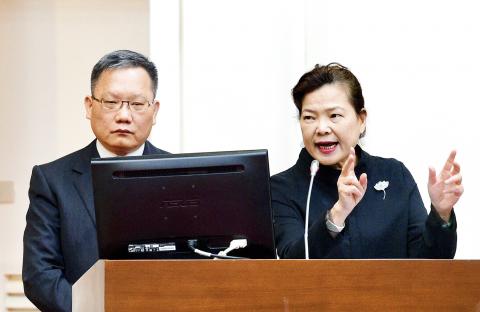Export orders last month contracted for a 12th straight month, slipping 3.5 percent year-on-year to US$47.28 billion, the Ministry of Economic Affairs said yesterday, as traditional industries saw orders falter.
“Traditional industries are the ones that have suffered most from the trade conflict between the US and China,” Department of Statistics Director Huang Yu-ling (黃于玲) told a news conference in Taipei.
Huang pointed to plunging raw material prices and declining investment in machinery as reasons behind the disappointing performance.

Photo: Peter Lo, Taipei Times
Orders for machinery equipment contracted 10.3 percent year-on-year to US$1.65 billion last month , while orders for base metal products decreased 14.8 percent to US$2.1 billion, ministry data showed.
On the bright side, orders for electronics rose 1.7 percent to US$12.95 billion after 11 consecutive months of declines, the ministry said.
“It was mainly due to new models of smartphones and wearable devices hitting the market last month,” Huang said, adding that orders from Europe increased by US$220 million, while those from China and Hong Kong rose by US$210 million.
Rising orders related to new applications such as high-performance computing, 5G, foundry, IC design and printed circuit boards further contributed to the increase, he added.
However, export orders for information and communications technology products edged down 0.2 percent to US$16.31 billion, as orders for laptops and servers shrank, the ministry said.
“The demand for laptops has not waned, but we are seeing a decline in prices,” Huang said, adding that he remained optimistic that orders would rise by the end of the year as Christmas sales approach.
While global orders for servers suffered a setback, Taiwanese companies have increasingly relocated production back home, helping exports of servers over the past 10 months to increase more than threefold on an annual basis to US$2.76 billion, she said.
“More significantly, exports of servers to the US increased about 23 times [year-on-year] in the same period to US$2.01 billion,” she added.
With Chinese goods flooding the flat-panel market, orders for optoelectronics fell 13.8 percent year-on-year to US$1.95 billion, the ministry said, but added that increasing orders for camera lenses for smartphones cushioned the fall.
Export orders for petrochemicals fell 24.2 percent and those for plastic and rubber products declined 13.3 percent to US$1.62 billion and US$1.81 billion respectively, as international crude oil prices plummeted, the ministry said.
In the first 10 months of this year, export orders dropped 5.8 percent to US$396.24 billion from a year earlier.
Orders for this month are expected to further decline by 1.4 to 3.5 percent, Huang said, adding that overall orders for this year would slip by 4 to 6 percent from last year.

KEEPING UP: The acquisition of a cleanroom in Taiwan would enable Micron to increase production in a market where demand continues to outpace supply, a Micron official said Micron Technology Inc has signed a letter of intent to buy a fabrication site in Taiwan from Powerchip Semiconductor Manufacturing Corp (力積電) for US$1.8 billion to expand its production of memory chips. Micron would take control of the P5 site in Miaoli County’s Tongluo Township (銅鑼) and plans to ramp up DRAM production in phases after the transaction closes in the second quarter, the company said in a statement on Saturday. The acquisition includes an existing 12 inch fab cleanroom of 27,871m2 and would further position Micron to address growing global demand for memory solutions, the company said. Micron expects the transaction to

Vincent Wei led fellow Singaporean farmers around an empty Malaysian plot, laying out plans for a greenhouse and rows of leafy vegetables. What he pitched was not just space for crops, but a lifeline for growers struggling to make ends meet in a city-state with high prices and little vacant land. The future agriculture hub is part of a joint special economic zone launched last year by the two neighbors, expected to cost US$123 million and produce 10,000 tonnes of fresh produce annually. It is attracting Singaporean farmers with promises of cheaper land, labor and energy just over the border.

US actor Matthew McConaughey has filed recordings of his image and voice with US patent authorities to protect them from unauthorized usage by artificial intelligence (AI) platforms, a representative said earlier this week. Several video clips and audio recordings were registered by the commercial arm of the Just Keep Livin’ Foundation, a non-profit created by the Oscar-winning actor and his wife, Camila, according to the US Patent and Trademark Office database. Many artists are increasingly concerned about the uncontrolled use of their image via generative AI since the rollout of ChatGPT and other AI-powered tools. Several US states have adopted

A proposed billionaires’ tax in California has ignited a political uproar in Silicon Valley, with tech titans threatening to leave the state while California Governor Gavin Newsom of the Democratic Party maneuvers to defeat a levy that he fears would lead to an exodus of wealth. A technology mecca, California has more billionaires than any other US state — a few hundred, by some estimates. About half its personal income tax revenue, a financial backbone in the nearly US$350 billion budget, comes from the top 1 percent of earners. A large healthcare union is attempting to place a proposal before